
Journal of Soil Science and Plant Nutrition
Scope & Guideline
Fostering sustainable practices through cutting-edge research.
Introduction
Aims and Scopes
- Soil Fertility and Nutrient Management:
Research on improving soil fertility through various amendments, including organic and inorganic fertilizers, biochar, and nanotechnology. The journal explores how these practices affect soil health, nutrient retention, and crop productivity. - Plant-Microbe Interactions:
Studies investigating the role of soil microorganisms, including bacteria and fungi, in enhancing plant growth, nutrient uptake, and stress resilience. This includes the use of biofertilizers and mycorrhizal associations. - Environmental Stress Mitigation:
Research focused on understanding how different plant species and amendments can mitigate the effects of abiotic stresses such as salinity, drought, and heavy metal toxicity on crops. - Sustainable Agricultural Practices:
Exploration of innovative agricultural practices, including crop rotation, cover cropping, and conservation tillage, aimed at enhancing soil health and sustainability in agroecosystems. - Soil Remediation Techniques:
Studies aimed at developing and assessing methods for soil remediation, particularly in contaminated lands, using various organic and inorganic amendments to restore soil health.
Trending and Emerging
- Biofortification and Nutrient Enhancement:
There is an increasing focus on biofortification techniques aimed at enhancing the nutritional quality of crops, particularly through the use of micronutrient fertilizers and biostimulants to combat hidden hunger. - Nanotechnology in Agriculture:
Research on the application of nanomaterials in agriculture, particularly as fertilizers and soil amendments, is rapidly gaining traction. This includes studies on nanofertilizers that improve nutrient uptake and stress tolerance. - Plant Stress Resilience:
Emerging studies are emphasizing plant resilience to abiotic stresses, such as drought and salinity, through various interventions, including the use of plant growth-promoting rhizobacteria and organic amendments. - Soil Health and Ecosystem Services:
There is a growing trend towards understanding soil health not just as a medium for plant growth, but as a critical component of ecosystem services, including carbon sequestration, biodiversity, and water regulation. - Integrated Soil Fertility Management:
Research on integrated approaches that combine organic and inorganic amendments for improving soil fertility is trending, reflecting a holistic understanding of soil and plant interactions.
Declining or Waning
- Traditional Chemical Fertilizers:
There is a notable decline in studies solely focused on traditional chemical fertilizers without integrating sustainable practices. Researchers are increasingly exploring organic and innovative fertilizers, leading to a reduced emphasis on conventional methods. - Single Crop Systems:
Research on single crop systems, particularly in the context of monoculture, is declining. There is a growing focus on intercropping and diversified cropping systems, which are seen as more sustainable and resilient. - Soil Erosion Studies:
While still important, the frequency of studies explicitly focused on soil erosion has decreased, possibly due to a shift towards integrated soil management practices that address erosion as part of broader soil health strategies. - Heavy Metal Contamination:
Research specifically targeting heavy metal contamination in soils appears to be waning, as newer studies increasingly integrate this issue within broader themes of soil health and sustainable agriculture.
Similar Journals

Agronomy-Basel
Cultivating Knowledge for Sustainable AgricultureAgronomy-Basel is a leading international journal dedicated to advancing the field of agronomy and crop science, published by the respected MDPI. Since its inception in 2011, this open-access journal has provided a vital platform for the dissemination of high-quality research, featuring innovative studies and reviews that contribute to the understanding of agricultural practices and crop management. With an impressive impact factor and ranked in the Q1 quartile of its category for 2023, Agronomy-Basel has established itself as a premier resource in the realm of Agricultural and Biological Sciences, achieving a commendable rank of #62 out of 406 in its field, placing it in the 84th percentile. The journal targets researchers, professionals, and students who are dedicated to enhancing agricultural sustainability and productivity. Located in Basel, Switzerland, the journal's commitment to open access empowers global accessibility to flourishing agricultural advancements, thus fostering collaboration and innovation across the globe.
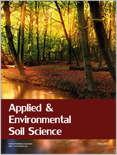
Applied and Environmental Soil Science
Advancing sustainable solutions for soil and environmental health.Applied and Environmental Soil Science, an esteemed journal published by HINDAWI LTD, focuses on disseminating high-quality research in the fields of soil science and environmental applications. With an ISSN of 1687-7667 and an E-ISSN of 1687-7675, this open-access journal has been a vital resource for the academic community since its inception in 2009. As of 2023, it holds a commendable position in the Q2 category for both Earth-Surface Processes and Soil Science, highlighting its impact in these crucial disciplines. The journal’s rankings further affirm its significance within the field, being placed 61st in Earth and Planetary Sciences and 58th in Agricultural and Biological Sciences. Researchers and practitioners alike benefit from the collaborative platform it offers for sharing innovative studies essential for sustainable soil management and environmental integrity. With a focus on advancing knowledge and fostering interdisciplinary dialogue, Applied and Environmental Soil Science stands as a crucial pillar for scholars and professionals dedicated to addressing the pressing challenges of soil and environmental health.
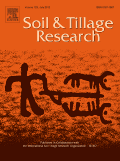
SOIL & TILLAGE RESEARCH
Exploring Innovations in Soil ManagementSOIL & TILLAGE RESEARCH is a premier international journal dedicated to advancing the understanding of soil science and tillage practices through high-quality research and insightful reviews. Published by Elsevier and based in the Netherlands, this esteemed journal boasts impressive impact metrics, being ranked in the Q1 category across multiple domains including Agronomy and Crop Science, Earth-Surface Processes, and Soil Science, reflecting its pivotal role in the academic community. With an H-Index that underscores its citation impact and a Scopus ranking placing it in the top percentiles of its field, SOIL & TILLAGE RESEARCH serves as a vital resource for researchers and professionals focusing on sustainable agricultural practices, soil management, and environmental conservation. This journal provides a platform for open dialogue and dissemination of knowledge that shapes future research directions and policy-making in land use and sustainable agriculture.

Frontiers in Soil Science
Bridging research and practice in soil health.Frontiers in Soil Science, published by FRONTIERS MEDIA SA in Switzerland, is an esteemed open-access journal dedicated to advancing our understanding of soil systems and their vital role in ecosystem functioning and sustainable agricultural practices. Since its inception in 2021, this journal has quickly established itself within the scientific community, boasting a 2023 Scopus Q2 ranking in Soil Science and a notable percentile of 41 among its peers. Researchers and practitioners in the field will find a wide array of original research, reviews, and contributions that address key topics such as soil health, carbon sequestration, and nutrient cycling. With a commitment to fostering collaboration and dissemination of knowledge, Frontiers in Soil Science serves as a vital resource for professionals, researchers, and students who aspire to innovate and lead in soil science research.

Crop Forage & Turfgrass Management
Advancing agricultural practices for a sustainable future.Crop Forage & Turfgrass Management, published by WILEY, serves as an essential platform for researchers, professionals, and students in the fields of agronomy, crop science, plant science, and soil science. With a focus on advancing knowledge in the management of crops, forage systems, and turfgrass, this journal plays a pivotal role in disseminating innovative research and practical applications that drive agricultural sustainability and productivity. Despite its Q3 ranking in various agricultural and biological science categories according to Scopus, it aims to enhance its impact and relevance in the academic community through high-quality publications. As a journal converged from 2015 to 2024, it invites contributions that address contemporary challenges and solutions in crop management, ensuring accessibility to vital knowledge for the advancement of agricultural practices. Situated in the United States, it also reflects the diverse agricultural landscapes and practices of the region, making it a valuable resource for a global audience.
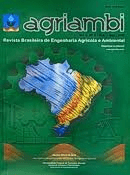
Revista Brasileira de Engenharia Agricola e Ambiental
Pioneering Research in Agricultural and Environmental SciencesRevista Brasileira de Engenharia Agricola e Ambiental, published by the Universidade Federal de Campina Grande, serves as a pivotal platform for researchers and professionals in the fields of agricultural and biological sciences, agronomy, and environmental engineering. With an open-access policy since 2000, this journal aims to foster global dissemination of innovative research and practices, ensuring that high-quality findings are accessible to all. Operating in Brazil, it holds notable rankings, including Q2 in the categories of Agricultural and Biological Sciences (miscellaneous) and Agronomy and Crop Science, indicating its strong academic impact and influence within these fields. As of 2023, it ranks #68 out of 193 in Agricultural and Biological Sciences and #188 out of 406 in Agronomy and Crop Science, representing its commitment to advancing scientific knowledge. The journal primarily focuses on publishing studies that address challenges in agricultural engineering and environmental sustainability, making it an essential read for students, researchers, and professionals who are dedicated to innovation and excellence in these dynamic fields.

Gesunde Pflanzen
Advancing the Science of Plant HealthGesunde Pflanzen is a prestigious peer-reviewed journal published by Springer, based in Germany. Specializing in the fields of agricultural and biological sciences, this journal has established itself as an essential resource for researchers, professionals, and students interested in plant health and pathology. With an impressive impact factor in the Q2 category, ranking 73 out of 221 within the general agricultural and biological sciences field (67th percentile as of 2023), Gesunde Pflanzen offers invaluable insights into current trends, challenges, and breakthroughs in plant research. The journal has been consistently publishing academic contributions since its inception in 1974, fostering advancements in agricultural practices and promoting sustainable plant health management strategies. While the journal does not currently offer open access options, its rigorous peer-review process ensures that published articles maintain high standards of scientific integrity and relevance. Researchers and professionals in the field are encouraged to engage with this journal to stay abreast of the latest findings and methodologies shaping the future of agriculture.
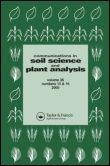
COMMUNICATIONS IN SOIL SCIENCE AND PLANT ANALYSIS
Advancing the Science of Soil and Plant InteractionsCOMMUNICATIONS IN SOIL SCIENCE AND PLANT ANALYSIS, published by Taylor & Francis Inc, is a prestigious journal dedicated to advancing research in the fields of agronomy, crop science, and soil science. Established in 1970, the journal has maintained a significant presence over the years, with a commitment to publishing high-quality, peer-reviewed articles that contribute to the understanding of soil and plant interactions. With an impressive Q2 ranking in both Agronomy and Soil Science, it positions itself as a vital resource for researchers, professionals, and students alike, keen on exploring innovative solutions to contemporary agricultural challenges. Although it currently does not provide open access, the journal ensures wide dissemination through its established subscription services. The journal's focus on empirical research, methodologies, and technological advancements in soil management and plant nutrition makes it an essential platform for disseminating knowledge and fostering discussions within the scientific community. Located in the heart of Philadelphia, USA, it remains a significant contributor to the global dialogue on sustainable agriculture and environmental stewardship.

ACS Agricultural Science & Technology
Transforming Agricultural Practices with Groundbreaking DiscoveriesACS Agricultural Science & Technology, published by the American Chemical Society, is an influential journal dedicated to the advancement of agricultural research and technologies. Since its convergence in 2021 and continuous publication until 2024, the journal has established itself in the fields of Agricultural and Biological Sciences, Agronomy and Crop Science, Food Science, and Plant Science, having achieved a commendable Q2 ranking across these categories in 2023. This signifies its growing impact and relevance within the global research community, evidenced by its Scopus rankings, which place it in the top percentiles of its fields. Although currently not an open-access journal, it provides a critical platform for disseminating pioneering research that addresses pressing agricultural challenges, fostering innovation in crop production, food security, and sustainable practices. As such, it serves as an essential resource for researchers, professionals, and students aiming to contribute to the future of agricultural science.
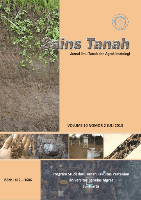
SAINS TANAH
Championing Research for a Greener TomorrowSAINS TANAH is a renowned peer-reviewed journal that focuses on the fields of agronomy, soil science, and environmental studies, published by Universitas Sebelas Maret Surakarta in Indonesia. Established as an Open Access platform since 2001, it aims to disseminate high-quality research that addresses critical issues in soil health, crop management, and pollution, thereby fostering sustainable agricultural practices. With its current impact factor demonstrating a Category Quartile ranking of Q3 and Q4 in major areas such as Agronomy and Crop Science, Atmospheric Science, and Pollution, SAINS TANAH serves as an essential resource for researchers, professionals, and students dedicated to advancing knowledge and solutions in these vital fields. By providing a collaborative environment and upholding rigorous academic standards, the journal not only highlights the significance of Indonesian research contributions but also aims to connect local insights with global agricultural and environmental challenges.